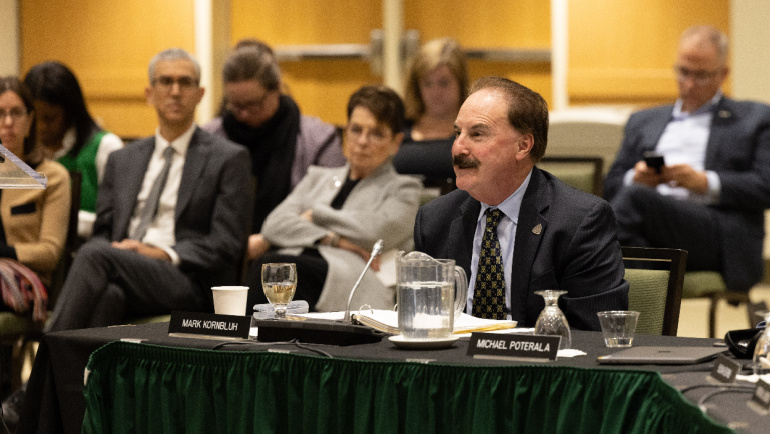
Over the last decade, Wayne State has been a national leader in increasing student success, with graduation rates more than doubling and now exceeding 60%. To continue this momentum, boost four- and six-year graduation rates, and save students money, the university’s Board of Governors has approved adoption of an undergraduate block tuition pricing model effective for fall 2023.
Under the new pricing structure, undergraduate students will pay the same amount of money whether they enroll in between 12 and 18 credits during any one semester, incentivizing them to take full course loads and allowing them to graduate sooner.
According to research by the National Student Clearinghouse, nationally, barely half of first-time, full-time students earned 24 or more credits in their first year of college. This means most aren’t on track to graduate in four — or even five — years.

“To fulfill Wayne State’s mission as a university of access and an engine of social mobility, we constantly strive to align our students’ goals with academic pathways to success,” said Mark Kornbluh, provost and senior vice president for academic affairs. “Research shows that students who take at least 15 credit hours per semester experience higher academic performance, are more likely to continue in college, and graduate more often and earlier than students who take fewer credit hours per semester.”
Equally important, decreasing the period of time it takes to earn a degree lowers its cost through savings in tuition, room and board, transportation, and other expenses and also reduces student loan debt. It also enables graduates to enter the workforce earlier, boosting their earning potential.
Lower-division students can potentially save $862 a year, and upper-division students could save as much as $1,023 a year with block tuition pricing, compared to paying for 30 credits by the credit hour. While a few students in specialized programs will pay different rates, block tuition will make a Wayne State degree dramatically more affordable for most students. Using this year’s lower division rates, under the new structure, Wayne State’s tuition and fees would be fifth least expensive among Michigan’s 15 public universities, dramatically below the state’s two other research universities. At the same time, the university will continue to invest heavily in affordability, guaranteeing access for students with financial need.

To help students take advantage of the new tuition structure, they will have access to advising and expanded academic support services, including tutoring and peer mentoring. In addition, Wayne State also offers programs like First-Year Interest Groups (FIGS), which assign students to a block schedule based on a specific academic interest or theme to take the guesswork out of selecting and registering for classes.
“Given the larger course loads, we will be monitoring student performance and scaling support services to ensure students are not falling behind academically,” said Ahmad Ezzeddine, vice president for academic student affairs and global engagement. “Our advisors will help students navigate their schedules and direct them to the appropriate support services to manage their coursework.”
Wayne State has many students — particularly adult students who are 25 or older and former students returning to complete degrees — who are unable to enroll full time and realize the benefits of block tuition. These students will continue to be charged per credit hour; however, their cost may be partially offset with financial aid.
“In implementing block tuition pricing, Wayne State is working hard to ensure that we are incentivizing student success and bringing down barriers to graduation,” said David Massaron, chief business officer, chief financial officer, senior vice president for finance and business operations, and treasurer. “We will utilize financial aid and special pricing for particular part-time programs to ensure that students are not disadvantaged.”
Wayne State’s dramatic graduation rate increases are attributed to continuous improvement of student success operations. It began in 2011, with a $10 million investment that allowed for the hiring of 45 additional academic advisors, improving curriculum in general education courses, increasing support for faculty teaching development, bolstering support for underprepared students, establishing first-year experiences for new students, and strengthening financial aid.
In 2019, the Student Success Operational Excellence (SSOE) office was developed to provide the concentrated effort required to inspire the next wave of innovation and deepen collaboration campuswide. SSOE initiatives have included deepening and facilitating collaboration with all student success stakeholders across campus, deepening the role of faculty with regard to undergraduate student success, and expanding the use of data and predictive analytics to offer more proactive support to students.
Wayne State will become the 11th Michigan public university with block tuition pricing.
